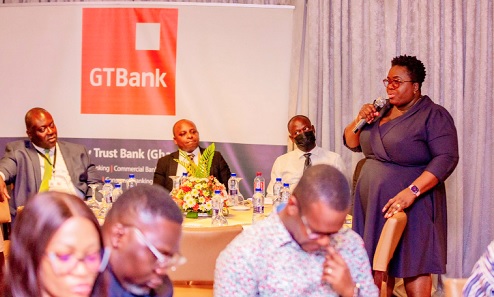adverts
GTBank earmarks package for SMEs T7rust Bank (Ghana) Ltd, one of the leading banks, has earmarked a special package to support small and medium enterprises (SMEs) which form the bulk of the country’s private sector.
The support is a mix of credit and hands-on training and advisory services to ensure that the SMEs develop the capacity to utilize credit the bank advances to them.
They include the SME Credit, SME Webinar Series and SME Business Suite, in addition to the regular products of the bank.
adverts
“We are going to be key partners to the various corporate institutions and SMEs that we deal with,” the Chief Finance Officer of the bank, Dr Calleb Osei, said.
GTBank, as it is also referred to, created the SME Credit product a few years ago under which it has so far disbursed over GH¢36 million to about 203 SME customers.
The eligible customers are entitled to a credit facility up to 98 per cent of their monthly net salaries for tenors ranging from a month to 12 months.
The customers are entitled to loans up to 25 per cent of their average credit net turnovers over a six-month period.
Out of the estimated 2.1 million businesses in the country’s micro, small and medium enterprises (MSME) sector, about 1.7 million are classified under the micro enterprise category, the small enterprise category makes up 15 per cent of all SMEs, with about 85,000 medium enterprises making up four per cent of all SMEs but contribute 47 per cent of the total MSME employment.
According to the Ghana Statistical Service (GSS), the informal sector, which is significantly dominated by MSMEs, contributed GH¢156.75 billion to nominal GDP in 2022.
The Chief Finance Officer said engagements with SMEs indicated that sometimes they failed not due to their inability to access credit but because they lacked certain capabilities.
Due to that, the bank had set up the webinar series to continue to engage, train and direct them on how they did their business.
Dr Osei said this when he and other senior managers of GTBank interacted with selected editors and managers of media houses in Accra.
He explained that given the recent challenges in the global economic space which had found expression in many countries across the globe, GTBank would again focus on providing credit to SMEs, corporate clients and other economic units to fuel the economy.
GTBank’s Chief Finance Officer insisted that the bank did not only want to give credit to its SME clients, but also “we will hold their hands throughout the business processes to ensure that they understand the intricacies of the current economic situation which is not peculiar to Ghana”.
Dr Osei said concerns expressed about access to loans was due to circumstances that had given rise to higher rates in the market.
“SMEs have been crying for loans but the average interest rate on the market was high, given that the Ghana reference rate was above 30 per cent,” he explained.
Dr Osei used the Nigerian currency, Naira, to buttress his point, saying in November last year, “if you had asked any analyst to predict how the Naira would behave, they would say the currency may depreciate by a certain percentage, but nobody could tell that it would move from 400 naira to the dollar to 1,500 as we speak today”.
In order to have access to low-cost funds, he said the bank was concluding a partnership with Development Bank Ghana to support SMEs.
Dr Osei emphasized that the bank would stay close with its business partners to ensure that they understood what was happening around them in order to take the right decisions.
“Which is why we at GT Bank would be supporting our business partners and clients throughout this year, but we know we have not seen the end of the challenges, it’s going to continue,” the Chief Finance Officer stated.
GTBank started operations in the country in 2006, with a focus to be a bank and company of choice.
This philosophy has been the guiding principle of the bank in all its major decisions, including the people it recruits down to how it serves its clients.
Dr Osei said the bank currently operated 37 branches, with presence in almost all regional capitals, supported by about 2,000 agency banking points, the GTExpres was run by shops, pharmacies and other small business operation centres in districts and sprawling towns.
The bank is credited with one of the most sophisticated networked and e-banking products that enable its customers to transact business from wherever they are.
“What we try to do is to have presence in the regional capitals to serve the environs. With GTExpress, you can transact basic banking such as deposits and withdrawals which ensures that at every corner in the country, the bank was well represented,” he explained.
The bank, which opened a branch in the Bono Regional capital, Sunyani, this year, expects to open a few more within the year.
Dr Osei said the bank, in line with corporate social responsibility, would continue to deliver important projects to communities in education, environment, community development and arts.
He stressed the importance of the media in its work, describing them as “great and critical partners” and called on practitioners to approach the bank with feedback and suggestions as part of serving its customers with quality services.


